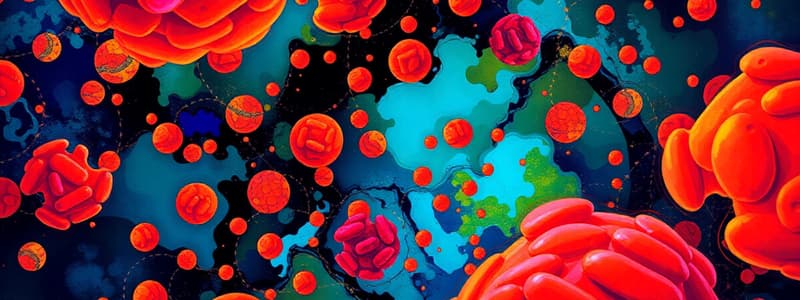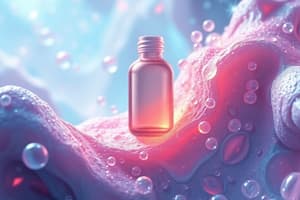Podcast
Questions and Answers
What does bioavailability refer to in pharmacology?
What does bioavailability refer to in pharmacology?
- The extent to which a drug is released from its dosage form.
- The process of drug disintegration into small particles.
- The rate at which a drug is manufactured.
- The fraction of a drug that is absorbed and reaches systemic circulation. (correct)
Which term describes the process by which a solid drug dissolves in solution?
Which term describes the process by which a solid drug dissolves in solution?
- Disintegration
- Manufacture
- Dissolution (correct)
- Bioequivalence
Which statement best describes therapeutic equivalence?
Which statement best describes therapeutic equivalence?
- It refers to two medicines having different active ingredients but similar effects.
- It indicates that two drugs share the same bioavailability.
- It requires drugs to be manufactured by the same company.
- It signifies comparable clinical effectiveness and safety between two medicines. (correct)
What is quality control in pharmaceuticals?
What is quality control in pharmaceuticals?
What is considered an intermediate product in pharmaceutical manufacturing?
What is considered an intermediate product in pharmaceutical manufacturing?
What does stability refer to in the context of a pharmaceutical product?
What does stability refer to in the context of a pharmaceutical product?
What is indicated by an expiration date that lists only a month and year?
What is indicated by an expiration date that lists only a month and year?
What is meant by expiration dating period or shelf-life?
What is meant by expiration dating period or shelf-life?
Which temperature range is considered room temperature for pharmaceutical storage?
Which temperature range is considered room temperature for pharmaceutical storage?
What is the purpose of stability studies in pharmaceuticals?
What is the purpose of stability studies in pharmaceuticals?
Flashcards
Drug Disintegration
Drug Disintegration
The breakdown of a solid drug into smaller particles.
Drug Dissolution
Drug Dissolution
The process where the active drug ingredient dissolves into a solution.
Drug Absorption
Drug Absorption
The movement of a drug into the bloodstream.
Bioavailability
Bioavailability
Signup and view all the flashcards
Bioequivalence
Bioequivalence
Signup and view all the flashcards
Therapeutic Equivalence
Therapeutic Equivalence
Signup and view all the flashcards
Quality Control
Quality Control
Signup and view all the flashcards
Finished Product
Finished Product
Signup and view all the flashcards
Stability
Stability
Signup and view all the flashcards
Expiration Date
Expiration Date
Signup and view all the flashcards
Study Notes
Drug Disintegration and Dissolution
- Disintegration: The breakdown of a solid drug into smaller particles.
- Dissolution: The process by which the active ingredient in a solid drug dissolves into a solution.
Drug Absorption and Bioavailability
- Absorption: The movement of a drug into the bloodstream.
- Bioavailability: The amount of drug that reaches systemic circulation unchanged.
Bioequivalence & Therapeutic Equivalence
- Bioequivalence: Two drugs have comparable bioavailability if they reach systemic circulation at the same rate and extent.
- Therapeutic Equivalence: Two drugs have comparable clinical effectiveness and safety.
Pharmaceutical Quality and Manufacturing
- Quality: Intrinsic characteristics of a product that meet user needs.
- Quality Control: Physical and chemical tests to ensure raw materials and finished products meet specifications.
- Manufacture: All operations involved in producing a pharmaceutical product, from raw material procurement to finished product shipment.
- Starting Material: Any substance used to produce a pharmaceutical product, excluding packaging materials.
- Intermediate Product: Partially processed material that requires further manufacturing steps.
- Finished Product: A product that has undergone all manufacturing stages including packaging and labeling.
- Returned Product: Finished products sent back to the manufacturer.
- Production: All operations involved in preparing a pharmaceutical product, from material receipt to completed product.
- Packaging: Operations involved in transforming a bulk product into a finished product, including filling and labeling.
- Validation: Demonstrating that a procedure, process, or system consistently delivers expected results.
Pharmaceutical Stability and Expiration Dates
- Stability: The ability of a pharmaceutical product in its container to maintain defined physical, chemical, microbiological, therapeutic, and toxicological specifications over time under specific storage conditions.
- Expiration Date: The date on a product container indicating the expected date when the product remains within specifications.
- Expiration Dating Period (Shelf-Life): The duration a drug product is expected to remain within specifications, determined through stability studies.
- Shelf-storage Stability: Stability of a drug product at ambient room temperature (15-30°C).
- Storage: Safekeeping of starting materials, packaging, and finished products under specified conditions.
- Storage Conditions: Specified conditions for storing a product, including temperature, humidity, container, and light.
- Storage Temperatures: Actual storage temperature during stability studies:
- Refrigerator: 2°C to 8°C
- Freezer: Less than -10°C
- Cold Place: 8°C to 15°C
- Warm Place: 30°C to 40°C
- Room Temperature: 15°C to 30°C
Medical Terminology
- Contraceptive, Oral: A drug taken orally by women to prevent conception.
- Anti-anemic: A drug that stimulates the production of red blood cells.
- Anticholesteremic: A drug that lowers plasma cholesterol levels.
- Antihyperlipidemic: A drug that lowers plasma cholesterol and lipid levels.
- Anticoagulant, Systemic: A drug that slows blood clotting.
- Antihypertensive: A drug that lowers arterial blood pressure.
- Diuretic: A drug that promotes renal excretion of electrolytes and water.
- Hematinic: A drug that promotes hemoglobin formation by supplying iron.
- Metal Complexing Agent: A drug that binds to metals, removing them from solutions; used in treating metal poisoning.
- Systemically Acting Drug: A drug that is absorbed into systemic circulation and diffuses into all tissues.
- Anti-anginal: A coronary vasodilator used to prevent or treat angina pectoris.
- Antitussive: A drug that suppresses coughing.
- Bronchodilator: A drug that expands bronchiolar airways, used to treat asthma.
- Expectorant: A drug that decreases respiratory tract secretion viscosity and promotes its removal.
- Mucolytic: A drug that hydrolyses mucoproteins to reduce pulmonary mucous viscosity.
- Anticonvulsant: An antiepileptic drug that arrests convulsions.
- Antidepressant: A drug that induces mood elevation, used to treat depression.
- Anti-epileptic: An anticonvulsant drug that suppresses seizures.
- Hypnotic: A drug that induces sleep.
- Sedative: A drug that induces relaxation and reduces emotional tension.
- Antidiabetic: A drug that replaces or stimulates insulin secretion, used to treat diabetes mellitus.
- Antihypoglycemic: A drug that elevates plasma glucose levels, used to treat hypoglycemia.
- Analgesic: A drug that suppresses pain perception.
- Antipyretic: A drug that lowers body temperature during fever.
- Antirheumatic: A drug that alleviates inflammatory symptoms of arthritis.
- Digestive Aid: A drug that promotes digestion, usually by supplementing digestive enzymes.
- Antacid: A drug that neutralizes excess gastric acid.
- Anti-amebic: A drug that kills or inhibits Entamoeba histolytica.
- Anti-emetic: A drug that prevents vomiting.
- Emetic: A drug that induces vomiting, used to remove ingested poisons.
- Antiflatulent: A drug that reduces gastrointestinal gas.
- Antibacterial: A drug that kills or inhibits pathogenic bacteria.
- Antifungal, Systemic: A drug that kills or inhibits pathogenic fungi causing systemic and gastrointestinal infections.
- Antifungal, Topical: A drug that kills or inhibits pathogenic fungi causing topical infections.
- Antimalarial: A drug that kills or inhibits protozoa that cause malaria.
- Emollient: A topical drug that softens the skin.
- Keratolytic: A topical drug that softens the skin's keratin layer and promotes desquamation.
- Sun Screening Agent: A skin protectant that absorbs light energy that causes sunburn.
Studying That Suits You
Use AI to generate personalized quizzes and flashcards to suit your learning preferences.




